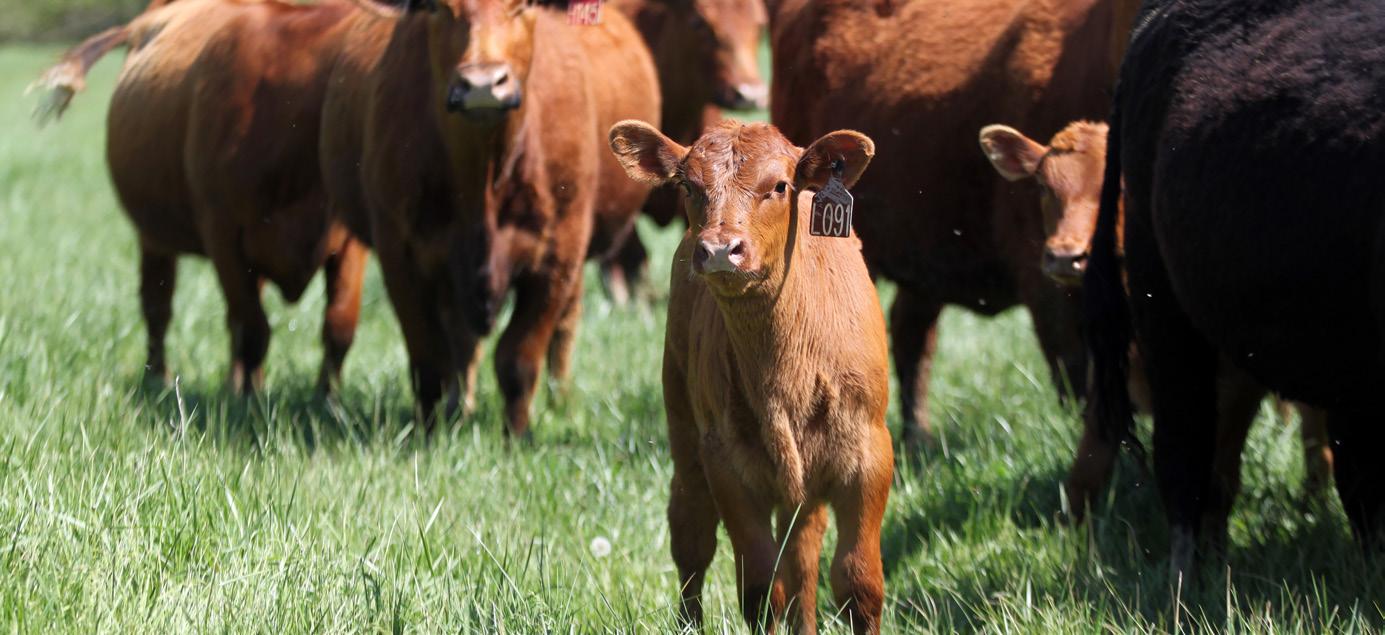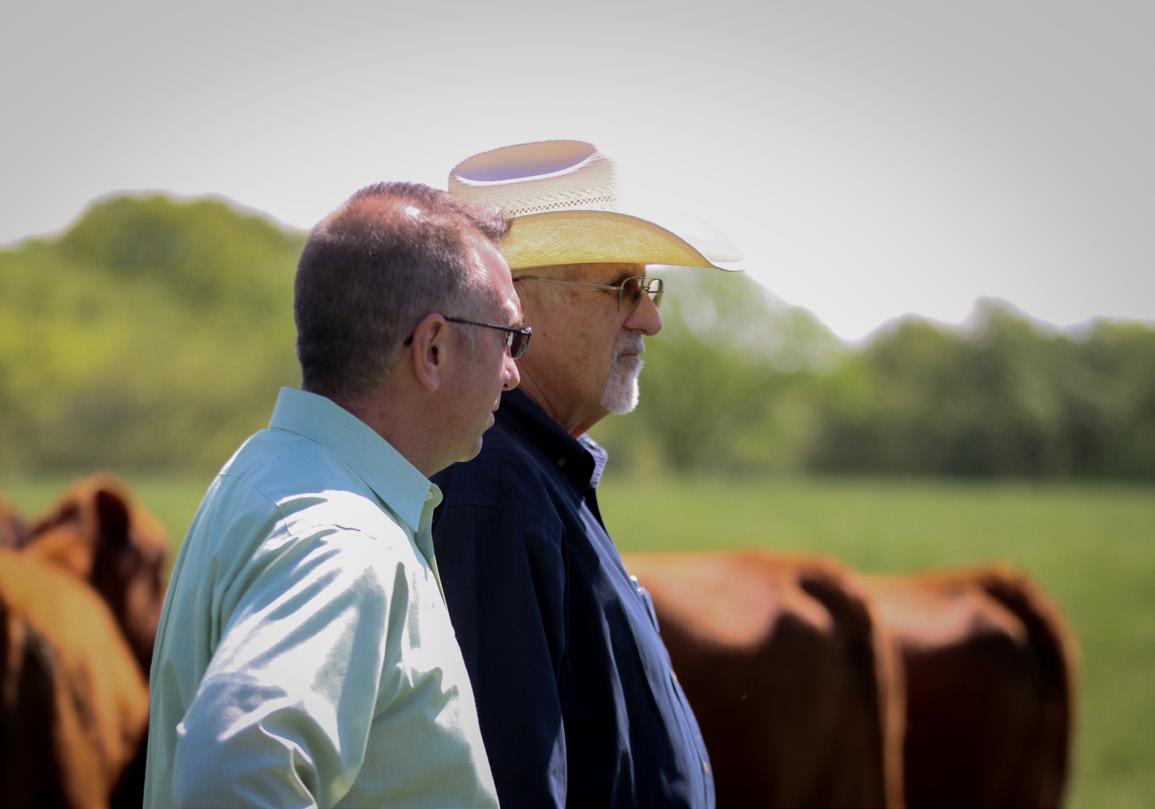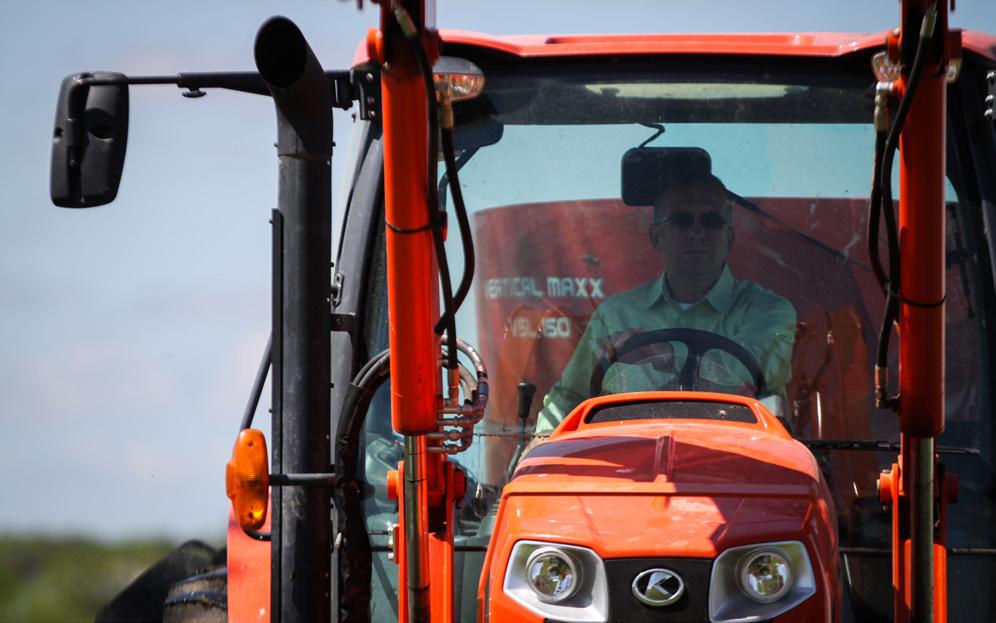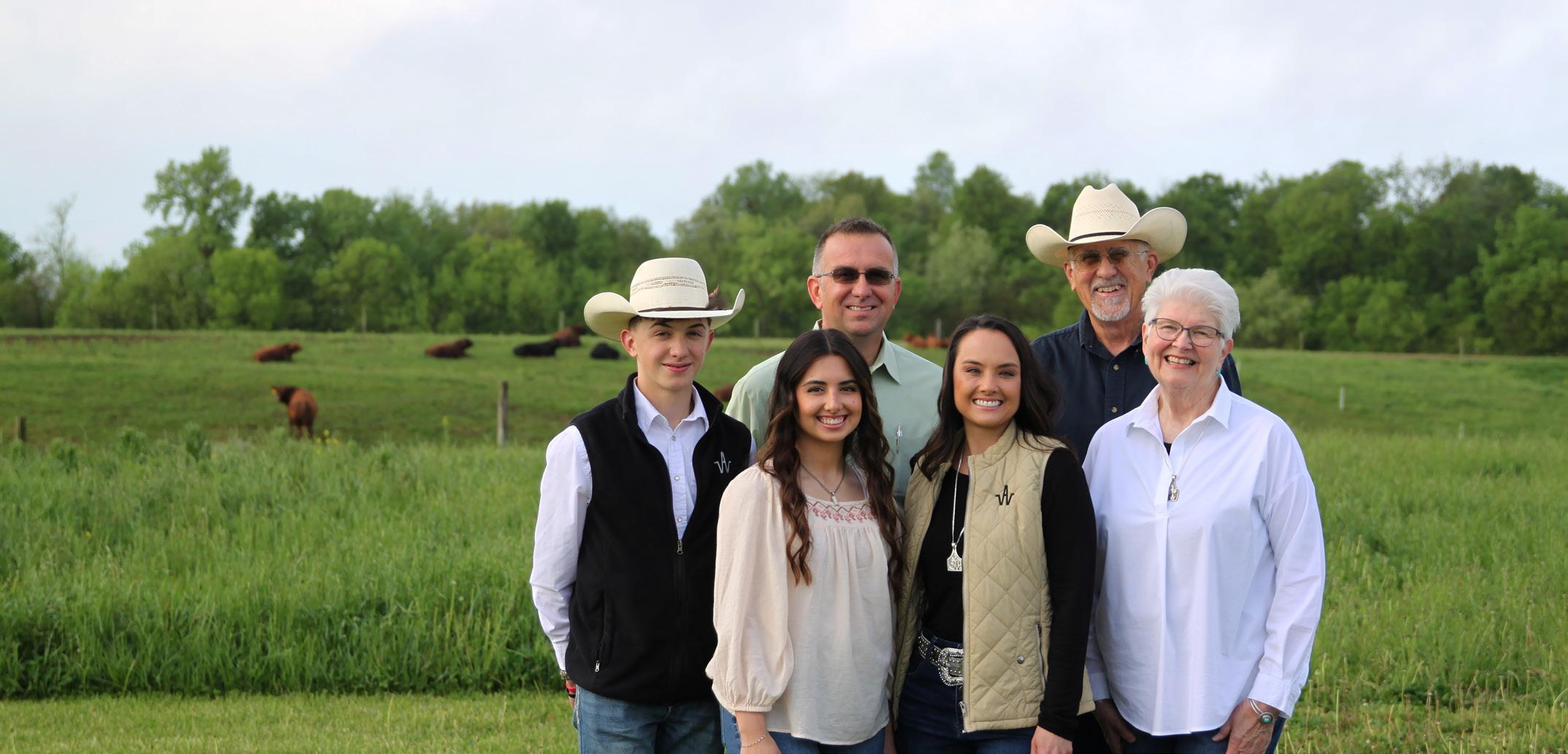
10 minute read
Leaving An Inheritance
Farm Family of the Year Multiplies Success
by Barb Anderson
Every beef producer looks for a unique equation to tally up goals toward success. For Andras Stock Farm in Manchester, Illinois, that formula includes seven generations raising three purebred breeds over a span of 125 years with one common denominator: a strong faith.
The Andras’ were named Illinois Beef Association Farm Family of the Year earlier this summer. Will Andras and his father, Steven, operate the farm. Will’s wife, Kim, and Steven’s wife, Theresa, participate in responsibilities as needed, along with Will and Kim’s children, Peri and Peyton, who represent the seventh generation of the cattle operation. Theresa is a retired registered nurse and Kim also works as an ag lender.

Flexibility Leads to Longevity
Key to the longevity of the operation has been a willingness to be flexible and change direction when required with cattle breeds, technology and economic conditions.
“We have been in the purebred beef business since 1898. I continued with what my father was doing. It has always been a family operation,” says Steven.
Andras ancestors came to the United States from England in the 1820s. They settled in New York and then Ohio and Missouri before helping establish Manchester in the 1830s. They bought their first registered Herefords in 1898, entering the purebred cattle business. They raised registered horned Herefords until 1965 and then transitioned into registered Polled Herefords.
In 1979, Steven took the reins of the farm at age 31, following his father’s untimely passing. “There was a great learning curve for me and a lot of challenges during that particular time,” he says. “Theresa and I had a young family with Will and his two sisters, Angela (Hoots) and Christi (Farrall). We focused on expanding the farm for the next generation.”
“I have to compliment my dad,” says Will. “He had a lot thrown on his shoulders at once. I was driving a tractor far younger than most. He gave me responsibility and knew I was able.”
“Will is very capable. He has also taken over the paperwork and the planning now that I am partially retired. We make a good team,” adds Steven. Will returned to the operation full time in 1997, after attending Oklahoma State University. Will’s sisters are not officially part of the farm, but they and their husbands help with the two Andras annual production sales. Will’s nieces, Olivia and Isabella also showed cattle as youth and provide help on sale days.
In the 1970s and 1980s, the Andras family experimented with a few different breeds and in 1985, settled on Red Angus to expand the herd.
“We were looking for a niche at that time because of the market saturation of Angus and Hereford producers in our area. My grandpa early in my dad’s life told him Red Angus would be the breed he was most likely to choose other than Herefords,” says Will. “We quickly realized the value for commercial cattle producers. Red Angus cows work well in our environment. They work for us — not the other way around.”

Will and Steven are also incorporating some registered Angus genetics into the herd to provide outcross genetics to the Red Angus breed. The goal is to mate the first-generation cattle with the goal of turning them red.
“Illinois is really not a cattle state,” says Will. “The availability of pasture is restricted as there is a lot of very good crop ground in this area, but our roots run deep in Illinois.”
In 2004, the family sold their row crop equipment to focus exclusively on cattle.
Today Andras Stock Farm runs about 250 cows. The spring-calving half of the herd is in Manchester and the fall calving group is in Fulton, Missouri, managed by Cynthia O’Bryan. They also work with small cooperators that raise embryo calves for them.
“The Andras Kind”
“The Andras Kind” is the phrase written at the bottom of each page of sale catalogs throughout the 1940s and 1950s. Steven and Will loved the sound of it, so they repurposed it as the branding of their two annual production sales. “The Andras Kind” bull sale is held the first Saturday in April and “The Andras Kind” female sale is the first Saturday in November.
“We develop the bulls on farm and gather the cows here for our sale,” says Will.
Providing customers with top quality cattle that offer proven performance is a priority. As technology improved, the family was quick to incorporate careful genetic (genomic) selection to augment phenotypic selection. Several years ago, Steven and Will were approached by specialists from the University of Illinois, University of Missouri and USDA to evaluate DNA using feed efficiency and carcass ultrasound data from large contemporary groups. The resulting data set offered a solid foundation and improved the viability of using DNA for these traits.
“We have certainly gotten more scientific to meet the needs of today’s producers. The cattle industry has gone through so many cycles, from great big frames and then back down again to now getting bigger again,” says Steven. “Bull styles, conditions and phenotypes will continue to come and go, but our integrity will not. That is what we must sell and that is what we do.”
Sean Evans, who owns Coal Creek Cattle with dad, Pat, in nearby Murrayville, is a long-time customer. He says the Andras family’s integrity is a large part of why they have done business for 30 years. “Will and Steven partner with you for success,” he says. “We could not be more pleased to have top-of-the-line genetics so close to us. The seedstock bulls we purchased have increased our herd quality and profitability. They are with us every step of the way.”

Steven and Will believe measuring and recording data is critical to a successful seedstock operation. “We utilize artificial insemination and embryo transfer. We incorporate ultrasound, genomically enhanced EPDs (expected progeny differences) and are very stringent in our contemporary grouping so our data are meaningful,” he says. “We want to make sure our customers do not show up and buy a random bull. We want to point to a bull’s performance within his contemporary group, his dam’s performance within the herd and follow up so we know where every animal is and where every animal is going.”
And since paychecks only come twice a year following the sales, Will says it is paramount to focus on all details on the front side and back side of “The Andras Kind” events.
“There is a lot of planning, legwork and paperwork,” he says. “Our production sales are much different than when I was young, when everything was sold as private treaty. People would come by the farm, look at the cattle, buy what they needed and take the cattle home.”
Today’s buyers now may view cattle and bid online. “Email expanded our business in the 1990s when I was able to take digital pictures and email them nationwide to secure deals,” says Will. “With online bidding, people can view what we have to offer and get a good feel for the cattle sight unseen. In fact, we have buyers I have never met in person. The opportunity to lean on a gate and have a face-to-face conversation with many customers simply is not an option.”
The Andras family has adopted technology to facilitate customer interaction and contact. Social media is also used as an advertising arm for the operation.
“For example, we take candid pictures at our sales to help build relationships with our customer base. Kim is quite good at capturing smiling customers and groups. She’s teaching this art to Peri, so we can continue to put our customers’ pictures in our catalogs. It also helps us familiarize ourselves with them,” he says.
Industry Accolades Add Up
The extra effort put forth has not gone unnoticed. The Andras family has been recognized for their contributions and dedication to the beef industry, as well as in the show ring. They have exhibited several Red Angus champions at such national shows as the North American International Livestock Exposition, Fort Worth Stock Show and National Western Stock Show.
Steven served on the Red Angus Association board of directors for two terms and was president from 2006 to 2008. He has received the Red Angus Personality of the Year award, which honors outgoing spokespersons for the breed, the John V. Robbins Distinguished Service Award, and Melvin Leland Innovative Leadership Award. He also created an event for the annual convention now known as the Steve Andras Prayer Breakfast, which is widely attended by convention attendees. Andras Stock Farm was IBA’s Seedstock Producer of the Year in 2006.



Seventh Generation Preps for Future
Peri, 19, and Peyton, 16, are already following in the leadership footsteps of their parents and grandparents. Peri, who just completed her first year at Lincoln Land Community College where she is a member of the livestock judging team, recently served on the Junior Red Angus Board of Directors. She plans to transfer to Kansas State University to pursue a degree in agricultural communications and provide the farm with future advertising support.
“My daughter, Natalie, is the same age as Peri. She looks to Peri and the rest of the family as mentors. As a result, she is studying at Murray State University to be a vet,” says Sean.
Peyton, a high school junior, is immersed in 4-H and FFA and looks forward to taking over and expanding the farm when it is his turn. Father Will says Peyton has excellent cattle sense and helps in all facets of the operation.
“I have learned a lot from my dad and grandpa. Mainly that working cows slower is getting it done faster,” he says. “I want to keep the farm going for future generations.”
“When my time is up, I feel very confident the work will go on,” says Steven, while Theresa laughs that he still works every day, adding, “Now through the grace of God, we can watch our grandchildren fill in the steps of their parents on the farm. We are very blessed.”
Will says he has stressed to his children the importance of learning both how to lead and how to be a team player. He believes livestock judging will give the kids the ability to make, stick to and defend decisions, along with develop competent and confident speaking skills.
“We want them to be successful. That does not necessarily mean financially. We want them to stay grounded and raise families in the fear and admonition of the Lord,” he says. “Cattle and land come and go. Those things are temporal. We want to cling to what is eternal.”
Kim agrees, adding, “Family is core to everything. We want them to succeed. Proverbs 13:22 says a good man leaves an inheritance to his children’s children. The goal for us as parents is to leave a legacy for our children and for their children.”
But the Andras family acknowledges there will always be variables in beef production. “There are financial restraints. Real estate values are so high it is almost prohibitive for those who wish to enter the business,” says Will. “Being able to pass on what we have to the next generation and subsequent generations is something that is very meaningful to us. We work hard to preserve what we have. It is not something we take lightly.”



